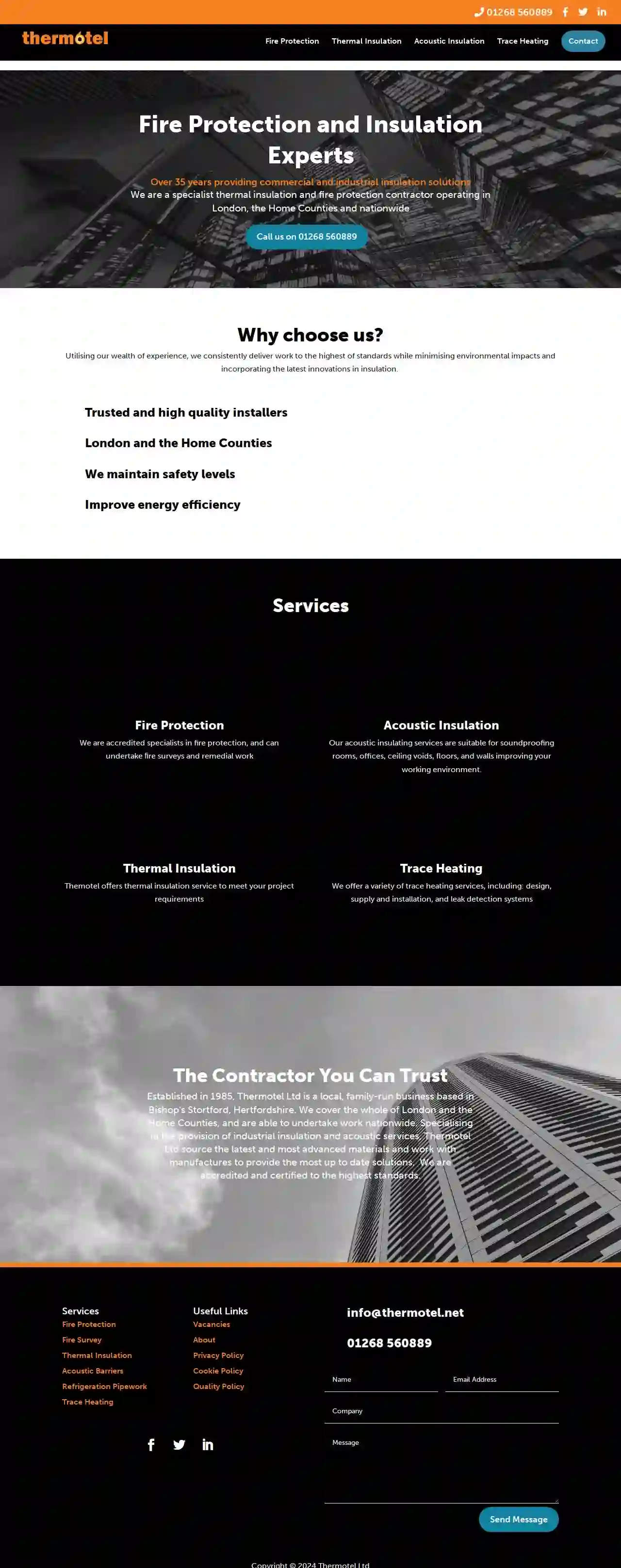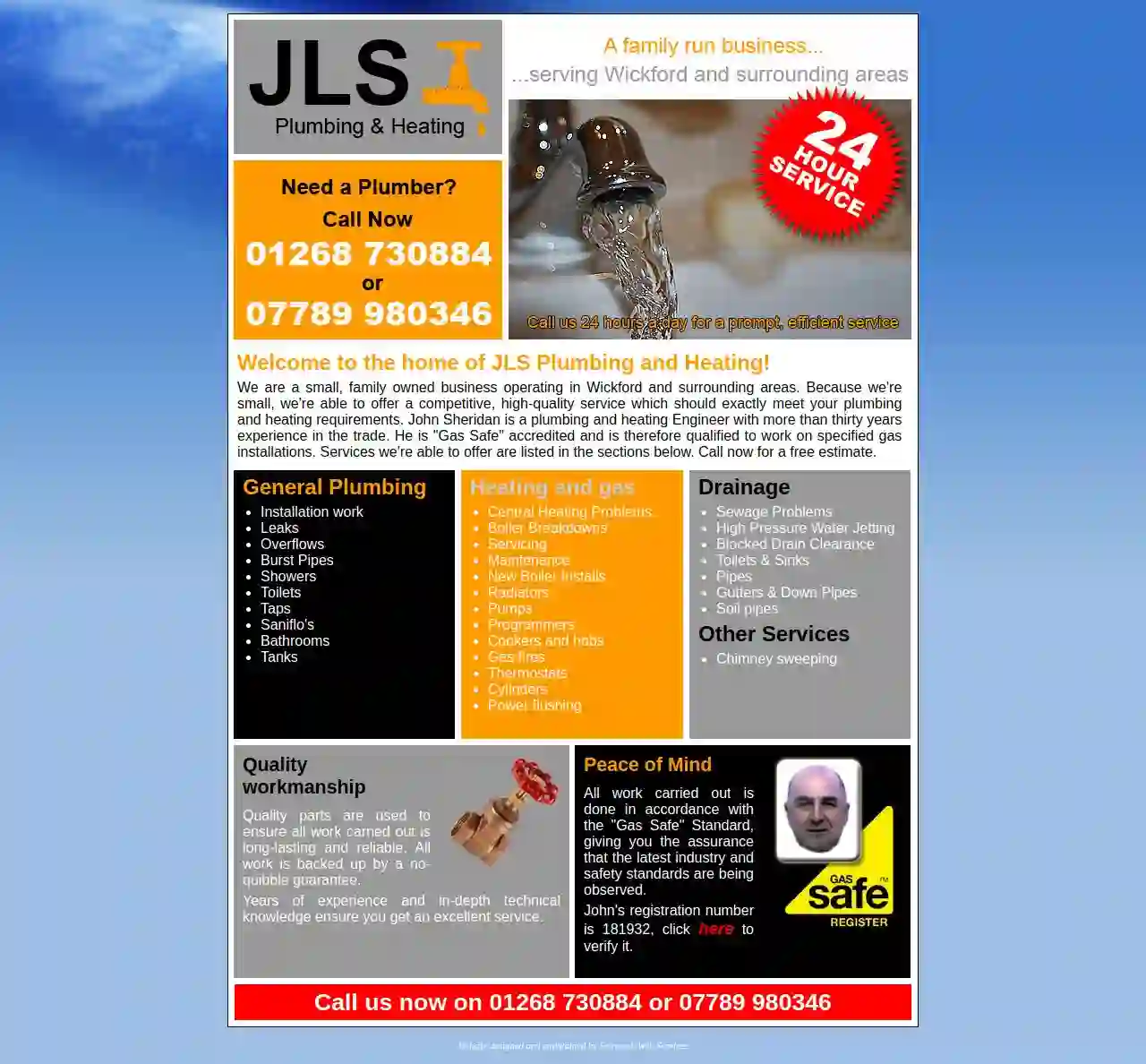Furnace Repair Wickford
Find the best Furnace Service in Wickford
Get multiple Furnace Service quotes for your project today! Compare profiles, reviews, accreditations, portfolio, etc... and choose the best offer.

Thermotel Ltd
33 reviews4 Robert Way, Wickford, SS11 8DD, GBFire Protection and Insulation Experts Over 35 years providing commercial and industrial insulation solutions We are a specialist thermal insulation and fire protection contractor operating in London, the Home Counties and nationwide Call us on 01268 560889 Why choose us? Utilising our wealth of experience, we consistently deliver work to the highest of standards while minimising environmental impacts and incorporating the latest innovations in insulation. Trusted and high quality installers London and the Home Counties We maintain safety levels Improve energy efficiency Established in 1985, Thermotel Ltd is a local, family-run business based in Bishop’s Stortford, Hertfordshire. We cover the whole of London and the Home Counties, and are able to undertake work nationwide. Specialising in the provision of industrial insulation and acoustic services, Thermotel Ltd source the latest and most advanced materials and work with manufactures to provide the most up to date solutions. We are accredited and certified to the highest standards.
- Services
- Why Us?
- Gallery
Get Quote
JLS Plumbing & Heating
51 reviewsWickford, GBWelcome to the home of JLS Plumbing and Heating! We are a small, family owned business operating in Wickford and surrounding areas. Because we're small, we're able to offer a competitive, high-quality service which should exactly meet your plumbing and heating requirements. John Sheridan is a plumbing and heating Engineer with more than thirty years experience in the trade. He is "Gas Safe" accredited and is therefore qualified to work on specified gas installations. We pride ourselves on quality workmanship and using quality parts to ensure all work carried out is long-lasting and reliable. All work is backed up by a no-quibble guarantee. Years of experience and in-depth technical knowledge ensure you get an excellent service. Peace of Mind All work carried out is done in accordance with the "Gas Safe" Standard, giving you the assurance that the latest industry and safety standards are being observed. John's registration number is 181932, click here to verify it.
- Services
- Why Us?
- Our Team
- Gallery
Get Quote
Over 1,991+ HVAC Businesses on our directory
Our HVAC contractors operate in Wickford and beyond!
HVACCompaniesHub has curated and vetted the Best HVAC Businesses arround Wickford. Find the most trustworthy contractor today.
Frequently Asked Questions about Furnace Repair
- Natural Gas Furnaces: These are the most popular type, fueled by natural gas, which is generally readily available and relatively affordable in many areas. Natural gas furnaces tend to be efficient and have lower operating costs compared to oil or propane furnaces.
- Propane Furnaces: Propane furnaces are similar to natural gas furnaces but run on propane, which is stored in a tank on your property..
- Oil Furnaces: Oil furnaces burn heating oil as fuel, which is stored in a tank. They require more maintenance and tend to be less efficient than gas furnaces.
- Electric Furnaces: Electric furnaces are fueled by electricity. Their installation cost is usually lower, but electricity prices can affect operating costs significantly.
- Banging or popping: Could indicate a buildup of sediment in the heat exchanger.
- Squealing or screeching: Often a sign of a problem with the blower motor or the inducer motor.
- Rumbling or vibrating: Check for loose parts or components.
- Clicking: May be from the igniter, but it can also come from other electrical problems If the clicking sound is persistent, it is best to contact an HVAC technician.
- Whining: Similar to squealing or screeching, this indicates an issue with a motor.
- Turn off the furnace: Set the thermostat to the 'off' position.
- Turn off the power: Locate the circuit breaker for your furnace and switch it off.
- Wait: Wait at least 30 seconds, though longer is sometimes recommended for the system to reset.
- Turn the power back on: Flip the circuit breaker back to the 'on' position.
- Turn on the furnace: Turn the thermostat back on and set it to your desired temperature.
How often should I get my furnace inspected?
What are the different types of furnaces?
Why is my furnace making strange noises?
How do I reset my furnace?
How often should I get my furnace inspected?
What are the different types of furnaces?
- Natural Gas Furnaces: fueled by natural gas Natural gas furnaces offer cleaner energy, especially compared to oil.
- Propane Furnaces: Propane furnaces are similar to natural gas furnaces These are a good option in areas where natural gas isn't accessible.
- Oil Furnaces: Oil furnaces burn heating oil as fuel, which is stored in a tank. They require more maintenance and tend to be less efficient than gas furnaces.
- Electric Furnaces: Electric furnaces use electric resistance heating elements to generate heat.. They are typically less expensive to purchase than gas furnaces, but they can be more expensive to operate depending on your electricity rates.
Why is my furnace making strange noises?
- Banging or popping: Could be due to dirty burners, delayed ignition, or expanding ducts.
- Squealing or screeching: Often indicates an issue with the blower motor or other moving parts.
- Rumbling or vibrating: Check for loose parts or components.
- Clicking: Could be caused by a faulty igniter, control board, or other electrical components. If the clicking sound is persistent, it is best to contact an HVAC technician.
- Whining: Similar to squealing or screeching, this indicates an issue with a motor.
How do I reset my furnace?
- Turn off the furnace: Set the thermostat to the 'off' position.
- Turn off the power: Locate the circuit breaker for your furnace and switch it off.
- Wait: Wait at least 30 seconds, though longer is sometimes recommended for the system to reset.
- Turn the power back on: Flip the circuit breaker back to the 'on' position.
- Turn on the furnace: Turn the thermostat back on and set it to your desired temperature.